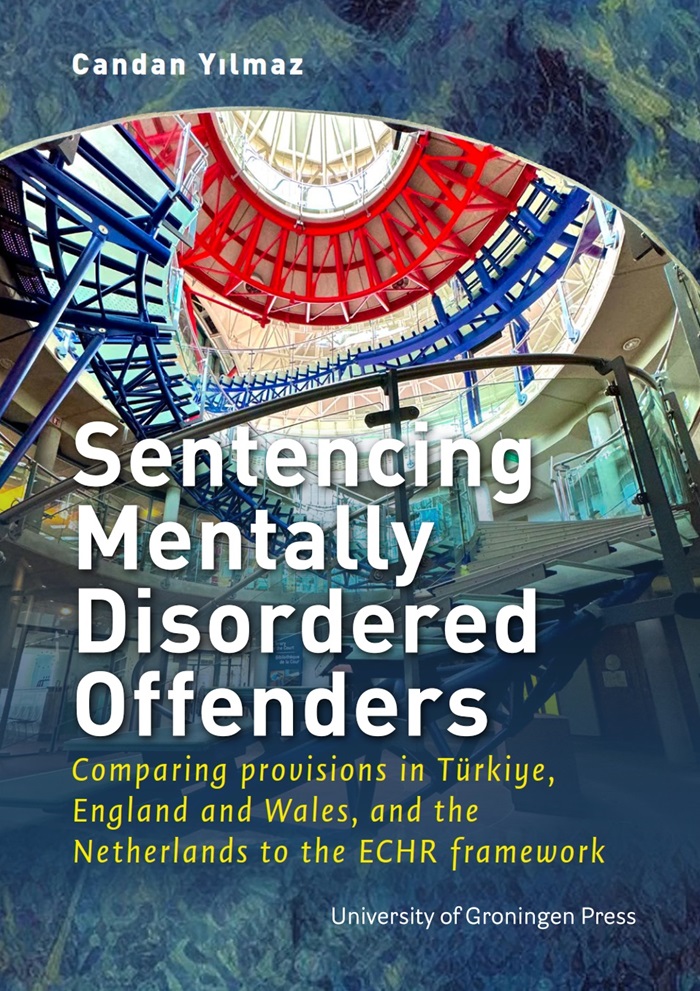
ThiePhD dissertation of Candan Yilmaz focuses on the comparative analysis of the regulations and practices concerning the sentencing of mentally disordered offenders in Türkiye, England and Wales, and the Netherlands, while also assessing these regulations against the framework of the European Convention on Human Rights (ECHR). The research highlights not only the distinctive legal approaches across different jurisdictions but also aims to enhance understanding of the Turkish criminal justice system, which is less known internationally. The research leads to recommendations for aligning legislation and practices regarding the sentencing of mentally disordered offenders with the ECHR-framework in all countries, which is especially helpful in this developing area in Türkiye. The dissertation seeks to fill a gap in literature regarding Turkish criminal law by comparing it with the more established systems of England and Wales and the Netherlands. The Netherlands represent a continental European tradition with a one-phase trial process, while England and Wales follow a common law tradition where trial and sentencing are separate. Each system has distinct views on criminal responsibility and varying sanctions for mentally disordered offenders. The Netherlands are noted for their 'terbeschikkingstelling' (TBS) system, a legal framework for high-risk mentally disordered offenders, which has gained international recognition.
As an analytical framework of this dissertation, with objective of evaluating the compliance of three selected criminal justice systems, an ECHR test is developed specifically for sentencing mentally disordered offenders, outlining the rights and obligations that are set out in the ECHR and the ECtHR case law. This framework can also be utilised to assess the compliance of other criminal justice systems to achieve the highest possible level of protection of fundamental human rights for mentally disordered offenders.
The dissertation further commences with the comparison of the legal and practical consequences of being a mentally disordered offender in Türkiye, England and Wales, and the Netherlands. It highlights key differences arising from their distinct legal traditions — civil law in Türkiye and the Netherlands versus common law in England and Wales. It is found that each system employs a distinct approach to the detention, care, and sentencing of mentally disordered offenders. Yilmaz subsequently, evaluates how well the three criminal justice systems adhere to the ECHR test, mainly limited to sentencing frameworks that are specifically intended for mentally disordered offenders. These are the security measure specific to the mentally disordered offenders in Türkiye, the hospital order in England & Wales in its various modalities, the TBS-order and the civil care referral by the criminal court (Article 2.3 Wfz) in the Netherlands. Overall, the analysis indicates that all three systems have established regulatory frameworks that value the protection of fundamental human rights and offer comprehensive regulatory systems. The compliance assessment therefore reveals that the majority of the examined topics demonstrate compliance with the ECHR test. There are, however, certain issues that require further consideration.
Consequently, the dissertation concludes with several recommendations aimed at enhancing the compliance of these systems with ECHR standards, also using insights and examples from the comparison between the three criminal justice system. These recommendations include establishing robust regulatory frameworks in Türkiye, reconsidering the treatability criterion in England and Wales, and addressing the long-stay provisions in the Netherlands. The overarching goal is to ensure that the rights of mentally disordered offenders are upheld effectively, thereby fostering a more humane and just criminal justice system across these jurisdictions.
This PhD dissertation sheds light on the complexities of sentencing mentally disordered offenders and also emphasizes the need for continual reform and alignment with international human rights standards, as well as the benefits of comparative legal research in this respect.
Yilmaz defended her dissertation on February 3rd at the Rijksuniversiteit Groningen. Supervisors: prof. dr. mr. Michiel van der Wolf en prof. dr. mr. Sanne Struijk.
Candan Yilmaz
Sentencing mentally disordered offenders. Comparing provisions in Türkiye, England and Wales, and the Netherlands to the ECHR framework
The dissertation is available at the repository of the Rijksuniversiteit Groningen.

